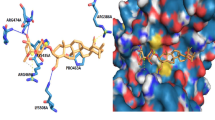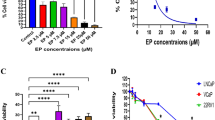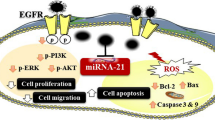Abstract
Autocrine growth hormone (GH) signaling is a promoting factor for breast cancer via triggering abnormal cell growth, proliferation, and metastasis, drug resistance. Curcumin (diferuloylmethane), a polyphenol derived from turmeric (Curcuma longa), has anti-proliferative, anti-carcinogenic, anti-hormonal effect via acting on PI3K/Akt, NF-κB and JAK/STAT signaling. Forced GH expression induced epithelial mesenchymal transition (EMT) through stimulation of miR-182-96-183 cluster expression in breast cancer cells. This study aimed to investigate the role of NF-κB signaling and miR-182-96-183 cluster expression profile on autocrine GH-mediated curcumin resistance, which was prevented by time-dependent curcumin treatment in T47D breast cancer cells. Dose- and time-dependent effect of curcumin on T47D wt and GH+ breast cancer cells were evaluated by MTT cell viability and trypan blue assay. Apoptotic effect of curcumin was determined by PI and Annexin V/PI FACS flow analysis. Immunoblotting performed to investigate the effect of curcumin on PI3K/Akt/MAPK, NF-κB signaling. miR182-96-183 cluster expression profile was observed by qRT-PCR. Overexpression of GH triggered resistant profile against curcumin (20 µM) treatment for 24 h, but this resistance was accomplished following 48 h curcumin exposure. Concomitantly, forced GH induced invasion and metastasis through EMT and NF-κB activation were prevented by long-term curcumin exposure in T47D cells. Moreover, 48 h curcumin treatment prevented the autocrine GH-mediated miR-182-96-183 cluster expression stimulation in T47D cells. In consequence, curcumin treatment for 48 h, prevented autocrine GH-triggered invasion-metastasis, EMT activation through inhibiting NF-κB signaling and miR-182-96-183 cluster expression and induced apoptotic cell death by modulating Bcl-2 family members in T47D breast cancer cells.







Similar content being viewed by others
Abbreviations
- BRMS1L:
-
Breast cancer metastasis suppressor-1 like
- DAPI:
-
4′,6-Diamidino-2-phenylindole
- DiOC6:
-
3,3′-Dihexyloxacarbocyanine iodide
- DMSO:
-
Dimethylsulfoxide
- EMT:
-
Epithelial to mesenchymal transition
- GH:
-
Growth hormone
- GHR:
-
GH receptor
- miRNAs:
-
microRNAs
- MMP:
-
Matrix metalloproteinase
- NF-κB:
-
Nuclear factor kappa B
- PI:
-
Propidium iodide
- PVDF:
-
Polyvildifluoride
- SDS-PAGE:
-
Sodium dodecyl sulfate polyacrylamide gel electrophoresis
- STAT-5:
-
Signal transducer and activator of transcription 5
- TBS:
-
Tris-buffered saline
- TIMP:
-
Tissue inhibitory matrix proteinase
- VEGF:
-
Vascular endothelial growth factor
References
Brunet-Dunand SE, Vouyovitch C, Araneda S, Pandey V, Vidal LJ, Print C, Mertani HC, Lobie PE, Perry JK (2009) Autocrine human growth hormone promotes tumor angiogenesis in mammary carcinoma. Endocrinology 150:1341–1352
Mukhina S, Mertani HC, Guo K, Lee KO, Gluckman PD, Lobie PE (2004) Phenotypic conversion of human mammary carcinoma cells by autocrine human growth hormone. Proc Natl Acad Sci USA 101:15166–15171
Zhu T, Starling-Emerald B, Zhang X, Lee KO, Gluckman PD, Mertani HC, Lobie PE (2005) Oncogenic transformation of human mammary epithelial cells by autocrine human growth hormone. Cancer Res 65:317–324
Chen YJ, Zhang X, Wu ZS, Wang JJ, Lau AY, Zhu T, Lobie PE (2015) Autocrine human growth hormone stimulates the tumor initiating capacity and metastasis of estrogen receptor-negative mammary carcinoma cells. Cancer Lett 365:182–189
Mojarrad M, Momeny M, Mansuri F, Abdolazimi Y, Tabrizi MH, Ghaffari SH, Tavangar SM, Modarressi MH (2010) Autocrine human growth hormone expression leads to resistance of MCF-7 cells to tamoxifen. Med Oncol 27:474–480
Bougen NM, Yang T, Chen H, Lobie PE, Perry JK (2011) Autocrine human growth hormone reduces mammary and endometrial carcinoma cell sensitivity to mitomycin C. Oncol Rep 26:487–493
Minoia M, Gentilin E, Mole D, Rossi M, Filieri C, Tagliati F, Baroni A, Ambrosio MR, E degli Uberti, Zatelli MC (2012) Growth hormone receptor blockade inhibits growth hormone-induced chemoresistance by restoring cytotoxic-induced apoptosis in breast cancer cells independently of estrogen receptor expression. J Clin Endocrinol Metab 97:E907–E916
Chauhan DP (2002) Chemotherapeutic potential of curcumin for colorectal cancer. Curr Pharm Des 8:1695–1706
Killian PH, Kronski E, Michalik KM, Barbieri O, Astigiano S, Sommerhoff CP, Pfeffer U, Nerlich AG, Bachmeier BE (2012) Curcumin inhibits prostate cancer metastasis in vivo by targeting the inflammatory cytokines CXCL1 and – 2. Carcinogenesis 33:2507–2519
Odot J, Albert P, Carlier A, Tarpin M, Devy J, Madoulet C (2004) In vitro and in vivo anti-tumoral effect of curcumin against melanoma cells. Int J Cancer 111:381–387
Kim B, Kim HS, Jung EJ, Lee JY, B KT, Lim JM, Song YS (2016) Curcumin induces ER stress-mediated apoptosis through selective generation of reactive oxygen species in cervical cancer cells. Mol Carcinog 55:918–928
Zhu Y, Bu S (2017) Curcumin induces autophagy, apoptosis, and cell cycle arrest in human pancreatic cancer cells. Evid Complement Alternat Med 2017:5787218
Lv ZD, Liu XP, Zhao WJ, Dong Q, Li FN, Wang HB, Kong B (2014) Curcumin induces apoptosis in breast cancer cells and inhibits tumor growth in vitro and in vivo. Int J Clin Exp Pathol 7:2818–2824
Thangapazham RL, Sharma A, Maheshwari RK (2006) Multiple molecular targets in cancer chemoprevention by curcumin. AAPS J 8:E443–E449
Pires BR, Mencalha AL, Ferreira GM, de Souza WF, Morgado-Diaz JA, Maia AM, Correa S, Abdelhay ES (2017) NF-kappaB is involved in the regulation of EMT genes in breast cancer cells. PLoS ONE 12:e0169622
Garg M (2013) Epithelial-mesenchymal transition—activating transcription factors—multifunctional regulators in cancer. World J Stem Cells 5:188–195
Yu Z, Baserga R, Chen L, Wang C, Lisanti MP, Pestell RG (2010) microRNA, cell cycle, and human breast cancer. Am J Pathol 176:1058–1064
Calin GA, Croce CM (2006) MicroRNA signatures in human cancers. Nat Rev Cancer 6:857–866
Li P, Sheng C, Huang L, Zhang H, Huang L, Cheng Z, Zhu Q (2014) MiR-183/-96/-182 cluster is up-regulated in most breast cancers and increases cell proliferation and migration. Breast Cancer Res 16:473
Ma Y, Liang AJ, Fan YP, Huang YR, Zhao XM, Sun Y, Chen XF (2016) Dysregulation and functional roles of miR-183-96-182 cluster in cancer cell proliferation, invasion and metastasis. Oncotarget 7:42805–42825
Coker-Gurkan A, Celik M, Ugur M, Arisan ED, Obakan-Yerlikaya P, Durdu ZB, Palavan-Unsal N (2018) Curcumin inhibits autocrine growth hormone-mediated invasion and metastasis by targeting NF-kappaB signaling and polyamine metabolism in breast cancer cells. Amino Acids
Hazan RB, Phillips GR, Qiao RF, Norton L, Aaronson SA (2000) Exogenous expression of N-cadherin in breast cancer cells induces cell migration, invasion, and metastasis. J Cell Biol 148:779–790
Ferlay J, Steliarova-Foucher E, Lortet-Tieulent J, Rosso S, Coebergh JW, Comber H, Forman D, Bray F (2013) Cancer incidence and mortality patterns in Europe: estimates for 40 countries in 2012. Eur J Cancer 49:1374–1403
Negri E, Braga C, La Vecchia C, Franceschi S, Parazzini F (1997) Family history of cancer and risk of breast cancer. Int J Cancer 72:735–738
Saha Roy S, Vadlamudi RK (2012) Role of estrogen receptor signaling in breast cancer metastasis. Int J Breast Cancer 2012:654–698
Siriwardana G, Bradford A, Coy D, Zeitler P (2006) Autocrine/paracrine regulation of breast cancer cell proliferation by growth hormone releasing hormone via Ras, Raf, and mitogen-activated protein kinase. Mol Endocrinol 20:2010–2019
Bahadori F, Demiray M (2017) A realistic view on “the essential medicinal chemistry of curcumin”. ACS Med Chem Lett 8:893–896
Nelson KM, Dahlin JL, Bisson J, Graham J, Pauli GF, Walters MA (2017) The essential medicinal chemistry of curcumin. J Med Chem 60:1620–1637
Lanning NJ, Carter-Su C (2006) Recent advances in growth hormone signaling. Rev Endocr Metab Disord 7:225–235
Waters MJ, Conway-Campbell BL (2004) The oncogenic potential of autocrine human growth hormone in breast cancer. Proc Natl Acad Sci USA 101:14992–14993
Aggarwal BB, Banerjee S, Bharadwaj U, Sung B, Shishodia S, Sethi G (2007) Curcumin induces the degradation of cyclin E expression through ubiquitin-dependent pathway and up-regulates cyclin-dependent kinase inhibitors p21 and p27 in multiple human tumor cell lines. Biochem Pharmacol 73:1024–1032
Thacker PC, Karunagaran D (2015) Curcumin and emodin down-regulate TGF-beta signaling pathway in human cervical cancer cells. PLoS ONE 10:e0120045
Gallardo M, Calaf GM (2016) Curcumin inhibits invasive capabilities through epithelial mesenchymal transition in breast cancer cell lines. Int J Oncol 49:1019–1027
Zhang W, Qian P, Zhang X, Zhang M, Wang H, Wu M, Kong X, Tan S, Ding K, Perry JK, Wu Z, Cao Y, Lobie PE, Zhu T (2015) Autocrine/paracrine human growth hormone-stimulated microRNA 96-182-183 cluster promotes epithelial-mesenchymal transition and invasion in breast cancer. J Biol Chem 290:13812–13829
Huber MA, Azoitei N, Baumann B, Grunert S, Sommer A, Pehamberger H, Kraut N, Beug H, Wirth T (2004) NF-kappaB is essential for epithelial-mesenchymal transition and metastasis in a model of breast cancer progression. J Clin Invest 114:569–581
Karin M, Cao Y, Greten FR, Li ZW (2002) NF-kappaB in cancer: from innocent bystander to major culprit. Nat Rev Cancer 2:301–310
Senftleben U, Cao Y, Xiao G, Greten FR, Krahn G, Bonizzi G, Chen Y, Hu Y, Fong A, Sun SC, Karin M (2001) Activation by IKKalpha of a second, evolutionary conserved, NF-kappa B signaling pathway. Science 293:1495–1499
Godwin P, Baird AM, Heavey S, Barr MP, O’Byrne KJ, Gately K (2013) Targeting nuclear factor-kappa B to overcome resistance to chemotherapy. Front Oncol 3:120
Marquardt JU, Gomez-Quiroz L, Arreguin Camacho LO, Pinna F, Lee YH, Kitade M, Dominguez MP, Castven D, Breuhahn K, Conner EA, Galle PR, Andersen JB, Factor VM, Thorgeirsson SS (2015) Curcumin effectively inhibits oncogenic NF-kappaB signaling and restrains stemness features in liver cancer. J Hepatol 63:661–669
Hamam R, Hamam D, Alsaleh KA, Kassem M, Zaher W, Alfayez M, Aldahmash A, Alajez NM (2017) Circulating microRNAs in breast cancer: novel diagnostic and prognostic biomarkers. Cell Death Dis 8:e3045
Wang W, Luo YP (2015) MicroRNAs in breast cancer: oncogene and tumor suppressors with clinical potential. J Zhejiang Univ Sci B 16:18–31
Liu Y, Han Y, Zhang H, Nie L, Jiang Z, Fa P, Gui Y, Cai Z (2012) Synthetic miRNA-mowers targeting miR-183-96-182 cluster or miR-210 inhibit growth and migration and induce apoptosis in bladder cancer cells. PLoS ONE 7:e52280
Poell JB, van Haastert RJ, de Gunst T, Schultz IJ, Gommans WM, Verheul M, Cerisoli F, van Puijenbroek A, van Noort PI, Prevost GP, Schaapveld RQ, Cuppen E (2012) A functional screen identifies specific microRNAs capable of inhibiting human melanoma cell viability. PLoS ONE 7:e43569
Qiu M, Liu L, Chen L, Tan G, Liang Z, Wang K, Liu J, Chen H (2014) microRNA-183 plays as oncogenes by increasing cell proliferation, migration and invasion via targeting protein phosphatase 2A in renal cancer cells. Biochem Biophys Res Commun 452:163–169
Song L, Liu L, Wu Z, Li Y, Ying Z, Lin C, Wu J, Hu B, Cheng SY, Li M, Li J (2012) TGF-beta induces miR-182 to sustain NF-kappaB activation in glioma subsets. J Clin Invest 122:3563–3578
Zekri A, Ghaffari SH, Yousefi M, Ghanizadeh-Vesali S, Mojarrad M, Alimoghaddam K, Ghavamzadeh A (2013) Autocrine human growth hormone increases sensitivity of mammary carcinoma cell to arsenic trioxide-induced apoptosis. Mol Cell Endocrinol 377:84–92
Bougen NM, Steiner M, Pertziger M, Banerjee A, Brunet-Dunand SE, Zhu T, Lobie PE, Perry JK (2012) Autocrine human GH promotes radioresistance in mammary and endometrial carcinoma cells. Endocr Relat Cancer 19:625–644
Zhu Z, Mukhina S, Zhu T, Mertani HC, Lee KO, Lobie PE (2005) p44/42 MAP kinase-dependent regulation of catalase by autocrine human growth hormone protects human mammary carcinoma cells from oxidative stress-induced apoptosis. Oncogene 24:3774–3785
Berrak O, Akkoc Y, Arisan ED, Coker-Gurkan A, Obakan-Yerlikaya P, Palavan-Unsal N (2016) The inhibition of PI3K and NFkappaB promoted curcumin-induced cell cycle arrest at G2/M via altering polyamine metabolism in Bcl-2 overexpressing MCF-7 breast cancer cells. Biomed Pharmacother 77:150–160
Acknowledgements
This work was supported by The Scientific and Technological Research Council of TURKEY (TUBITAK), Grand Number: 113Z791 and Istanbul Kultur University Scientific Projects Support Center. Authors wish to thank Busra Alper for her technical support in some immunoblotting results in Figs. 1d, 3a, 4a, 5a.
Author information
Authors and Affiliations
Corresponding author
Ethics declarations
Conflict of interest
The authors declare that they have no conflict of interest.
Ethical approval
This article does not involve any studies with human participants or animals performed by any of the authors. The research has been performed on commercially available cell lines.
Electronic supplementary material
Below is the link to the electronic supplementary material.
11033_2018_4479_MOESM1_ESM.jpg
The growth hormone expression profile in T47D GH+ breast cancer cell. The time dependent extracellular expression of GH in T47D breast cancer cell after GH inserted pcDNA3.1 (+) vector transfection and neomycin selection was determined by A. Immunoblotting and B. GH ELISA. P: Pellet, M: Medium, Humotrop was used as a positive control and β-actin was selected as a loading control.
Rights and permissions
About this article
Cite this article
Coker-Gurkan, A., Bulut, D., Genc, R. et al. Curcumin prevented human autocrine growth hormone (GH) signaling mediated NF-κB activation and miR-183-96-182 cluster stimulated epithelial mesenchymal transition in T47D breast cancer cells. Mol Biol Rep 46, 355–369 (2019). https://doi.org/10.1007/s11033-018-4479-y
Received:
Accepted:
Published:
Issue Date:
DOI: https://doi.org/10.1007/s11033-018-4479-y




